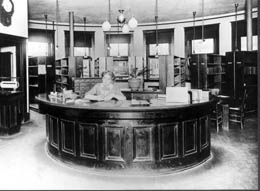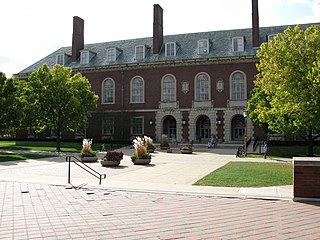
The reference desk or information desk of a library is a public service counter where professional librarians provide library users with direction to library materials, advice on library collections and services, and expertise on multiple kinds of information from multiple sources.

A public library is a library, most often a lending library, that is accessible by the general public and is usually funded from public sources, such as taxes. It is operated by librarians and library paraprofessionals, who are also civil servants.

Google Answers was an online knowledge market offered by Google, active from April 2002 until December 2006.

An interview is a structured conversation where one participant asks questions, and the other provides answers. In common parlance, the word "interview" refers to a one-on-one conversation between an interviewer and an interviewee. The interviewer asks questions to which the interviewee responds, usually providing information. That information may be used or provided to other audiences immediately or later. This feature is common to many types of interviews – a job interview or interview with a witness to an event may have no other audience present at the time, but the answers will be later provided to others in the employment or investigative process. An interview may also transfer information in both directions.

This page is a glossary of library and information science.

A librarian is a person who works professionally in a library providing access to information, and sometimes social or technical programming, or instruction on information literacy to users.

A research library is a library that contains an in-depth collection of material on one or several subjects. A research library will generally include an in-depth selection of materials on a particular topic or set of topics and contain primary sources as well as secondary sources. Research libraries are established to meet research needs and, as such, are stocked with authentic materials with quality content. Research libraries are typically attached to academic or research institutions that specialize in that topic and serve members of that institution. Large university libraries are considered research libraries, and often contain many specialized branch research libraries. The libraries provide research materials for students and staff of these organizations to use and can also publish and carry literature produced by these institutions and make them available to others. Research libraries could also be accessible to members of the public who wish to gain in-depth knowledge on that particular topic.

Jessamyn Charity West is an American library technologist and writer known for her activism and work on the digital divide. She is the creator of librarian.net. She is the Vermont Chapter Councilor of the American Library Association, and was Director of Operations at the group blog MetaFilter from 2005 to 2014. West owns MetaFilter.
Digital reference is a service by which a library reference service is conducted online, and the reference transaction is a computer-mediated communication. It is the remote, computer-mediated delivery of reference information provided by library professionals to users who cannot access or do not want face-to-face communication. Virtual reference service is most often an extension of a library's existing reference service program. The word "reference" in this context refers to the task of providing assistance to library users in finding information, answering questions, and otherwise fulfilling users’ information needs. Reference work often but not always involves using reference works, such as dictionaries, encyclopedias, etc. This form of reference work expands reference services from the physical reference desk to a "virtual" reference desk where the patron could be writing from home, work or a variety of other locations.
A lesson plan is a teacher's detailed description of the course of instruction or "learning trajectory" for a lesson. A daily lesson plan is developed by a teacher to guide class learning. Details will vary depending on the preference of the teacher, subject being covered, and the needs of the students. There may be requirements mandated by the school system regarding the plan. A lesson plan is the teacher's guide for running a particular lesson, and it includes the goal, how the goal will be reached and a way of measuring how well the goal was reached.

The following outline is provided as an overview of and topical guide to library and information science:
A reference interview is a conversation between a librarian and a library user, usually at a reference desk, in which the librarian responds to the user's initial explanation of their information need by first attempting to clarify that need and then by directing the user to appropriate information resources.

Readers' advisory is a service which involves suggesting fiction and nonfiction titles to a reader through direct or indirect means. This service is a fundamental library service; however, readers' advisory also occurs in commercial contexts such as bookstores. Currently, almost all North American public libraries offer some form of readers' advisory.
Library instruction, also called bibliographic instruction, user education and library orientation, consists of "instructional programs designed to teach library users how to locate the information they need quickly and effectively. [It] usually covers the library's system of organizing materials, the structure of the literature of the field, research methodologies appropriate to the academic discipline, and specific resources and finding tools " It prepares individuals to make immediate and lifelong use of information effectively by teaching the concepts and logic of information access and evaluation, and by fostering information independence and critical thinking. Above all they are aimed at equipping library users with skills to locate library sources and use them effectively to satisfy their information needs.
Library anxiety refers to the "feeling that one’s research skills are inadequate and that those shortcomings should be hidden". In some students this manifests as an outright fear of libraries and the librarians who work there. The term stems from a 1986 article by Constance Mellon, a professor of library science in the U.S. state of North Carolina, titled "Library anxiety: A grounded theory and its development" in the College & Research Libraries journal.

Transliteracy is "a fluidity of movement across a range of technologies, media and contexts". It is an ability to use diverse techniques to collaborate across different social groups.
A situational judgement test (SJT), also known as a situational stress test (SStT) or situational stress inventory (SSI), is a type of psychological test that presents the test-taker with realistic, hypothetical scenarios. The test-taker is asked to identify the most appropriate response or to rank the responses in order of effectiveness. SJTs can be administered through various modalities, such as booklets, films, or audio recordings. These tests represent a distinct psychometric approach compared to the traditional knowledge-based multiple-choice items and are frequently utilized in industrial-organizational psychology applications, such as personnel selection.

Isadore Gilbert Mudge was ranked by the magazine American Libraries as one of the top 100 important leaders that libraries have had in the 20th century. Mudge was a defining influence on what a contemporary reference librarian is and was essential for helping organize and promote reference books for use in helping patrons find information and answers to questions.
Jenny Levine is an American librarian and digital strategist who has been a longtime evangelist for the adoption of emerging Internet technologies by public libraries, in particular blogging and RSS. Since 2006, she has been a member of the RSS Advisory Board, a group that publishes the RSS specification and helps developers with web syndication. For over a decade, she has used her Shifted Librarian blog to encourage librarians to start blogs so they can "create an authentic voice for what has traditionally been a faceless, inhuman institution." One of the first librarians to publish a web site, which she began doing in 1995, her blog became so popular that she was once the top search result on Google for the term "Jenny."

The University Library at the University of Illinois Urbana-Champaign comprises a network of physical and digital libraries. It provides resources and services to the university's students, faculty, staff, and the broader academic community.










